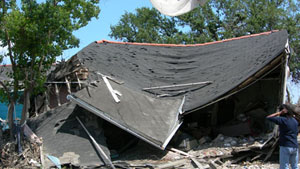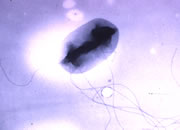For Specific Groups
Publications, Data, & Statistics
Water-related Emergencies & Outbreaks Resources
Healthy Water Sites
- Drinking Water
- Healthy Swimming/Recreational Water
- Global Water, Sanitation, & Hygiene (WASH)
- Other Uses of Water
- Water-related Emergencies & Outbreaks
- Water-related Hygiene

Water-related emergency preparedness and outbreak response has become one of the most significant and crucial issues in recent history. Individuals, families, and businesses have been advised to be prepared for emergencies by creating disaster supply kits that include appropriate amounts of safe drinking water. Emergencies can include natural disasters (for example, hurricanes, floods, and droughts) man-made disasters (for example, intentional contamination), and outbreaks (for example, infections linked to water exposure). Preparedness resources include preparedness toolkits, preparedness training, and directions for emergency disinfection.
Water-related Emergencies and Outbreaks Topics
Safe Drinking Water
Personal Water Storage, Wells, Community Water Systems...
Hygiene & Handwashing
Handwashing, Bathing, Dental, Wound Care...
Flood Water Exposure
Health Risks, Mold, Building Clean-up...
Septic & Wastewater
Septic Systems, Community Wastewater Treatment...
Cleaning & Sanitizing
Cleaning and sanitizing with bleach...
Water-related Emergencies and Outbreaks Fast Facts
- The largest waterborne disease outbreak in United States history occurred in 1993 in Milwaukee, WI when over 400,000 people became ill with diarrhea when the parasite Cryptosporidium was found in the city's drinking water supply 3.
- Legionnaire’s Disease got its name in 1976 from American Legion members who attended a convention in Philadelphia and were the first to suffer from an outbreak of this disease 4.
- During the historic 2005 Hurricane season, the National Oceanic and Atmospheric Administration (NOAA) ran out of names for major tropical storms, using letters of the Greek alphabet to name storms for the first time since storms began acquiring names in 1953 5.
- A preparedness supply kit should include one gallon of drinking water per day per person 2.
- Treating water with chlorine tablets, iodine tablets, or liquid bleach will not kill all parasites that can contaminate water; boiling or appropriate filtration is required 6.
Water-related Emergencies and Outbreaks

During water-related emergencies, the quality and safety of water can be compromised. Water-related emergencies can be created by natural disasters such as earthquakes, floods, hurricanes, tornadoes, and landslides. For a complete list of natural disasters and how to prepare and respond to them, please visit CDC's Natural Disasters and Severe Weather page.
A waterborne outbreak is a cluster of two or more infections caused by the same agent(s) and linked to the same water exposure. Outbreaks can be caused by water contaminated with pathogens, chemicals, or toxins which can be spread through ingestion of, contact with, or breathing contaminated
water 1.
In order to protect the health of a community affected by an outbreak or natural disaster, a Boil Water Advisory may be issued. For instructions to follow once an advisory is declared, visit one of the following:
- Centers for Disease Control and Prevention. Surveillance for Waterborne Disease Outbreaks Associated with Drinking Water — United States, 2007–2008. MMWR Morb Mortal Wkly Rep. 2011;60(No. SS 12);38-68.
- Centers for Disease Control and Prevention. Emergency Preparedness and You.
- Centers for Disease Control and Prevention. Surveillance for Waterborne Disease Outbreaks – United States, 1993-1994. MMWR Morb Mortal Wkly Rep. 1996:45(No. SS-1);1-33.
- Centers for Disease Control and Prevention. Patient Facts: Learn More about Legionnaires' disease.
- National Weather Service. 2005 Atlantic Hurricane Season.
- U.S. Environmental Protection Agency. Emergency Disinfection of Drinking Water.
Get email updates
To receive email updates about this page, enter your email address:
Contact Us:
- Centers for Disease Control and Prevention
1600 Clifton Rd
Atlanta, GA 30333 - 800-CDC-INFO
(800-232-4636)
TTY: (888) 232-6348 - New Hours of Operation
8am-8pm ET/Monday-Friday
Closed Holidays - cdcinfo@cdc.gov





